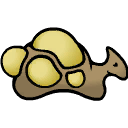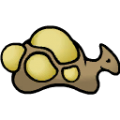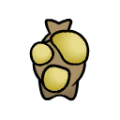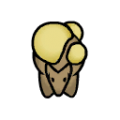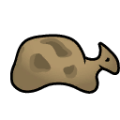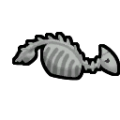Boomalope
Boomalope
Engineered for chemicals production, the boomalope grows a large sac of volatile chemicals on its back. Though it is weak and fragile for its size, other animals have learned to avoid it because of the huge explosion it produces when it dies. It can be milked to produce chemfuel - very carefully.
Base Stats
- Type
- Animal
- Flammability
- 70%
Pawn Stats
- Move Speed
- 3.4 c/s
- Health Scale
- 65% HP
- Body Size
- 2
- Mass - Baby
- 24 kg
- Mass - Juvenile
- 60 kg
- Mass - Adult
- 120 kg
- Carrying Capacity
- 150 kg
- Filth Rate
- 16
- Hunger Rate
- 0.86 Nutrition/Day
- Diet
- herbivorous
- Life Expectancy
- 15 years
- Manhunter Chance
- 10%
- Manhunter Chance (Taming)
- 10%
- Trainable Intelligence
- None
- Wildness
- 60%
- Minimum Handling Skill
- 5
- Roam Interval
- 2 days
- Mate Interval
- 12 hours
- Maturity Age
- 0.333 years (20 days)
- Juvenile Age
- 0.2 years (12 days)
- Comfortable Temp Range
- -15 °C – 40 °C (5 °F – 104 °F)
Production
- Meat Yield
- 280
 boomalope meat
boomalope meat - Leather Yield
- 80
 plainleather
plainleather - Milk Amount
- 11
 chemfuel
chemfuel - Milking Interval
- 1 days
- Gestation Period
- 6.66 days
- Offspring Per Birth
- 1
Melee Combat
- Attack 1
- Head
7 dmg (Blunt)
10 % AP
2 second cooldown
0.2 chance factor - Attack 2
- Front left leg
9 dmg (Blunt)
13 % AP
2 second cooldown - Attack 3
- Front left leg
9 dmg (Poke)
13 % AP
2 second cooldown - Attack 4
- Front right leg
9 dmg (Blunt)
13 % AP
2 second cooldown - Attack 5
- Front right leg
9 dmg (Poke)
13 % AP
2 second cooldown - Attack 6
- Teeth
10 dmg (Bite)
15 % AP
2 second cooldown
0.5 chance factor - Average DPS
- 2.8706
- tradeTags
- AnimalUncommon, AnimalFighter
Boomalopes, called boomalope calves when babies, are herbivores with a high hunger rate. They produce 11 chemfuel per day, and explode on death.
Acquisition
Boomalopes can be found in temperate forests, temperate swamps, tropical rainforests, tropical swamps, arid shrublands, and deserts. They can either be tamed by a Handler or self-tame in a random event.
Boomalopes can be bought and sold in other faction bases and from bulk goods traders. Boomalopes purchased from traders will be already tamed.
Summary
Boomalopes are pen animals. Once tamed, pen animals cannot and do not need to be trained any further. But if left outside of a pen or caravan hitching spot, pen animals will eventually roam outside your colony. Making a caravan is not required to tie animals to a caravan hitching spot. As pen animals, raiders will not attack boomalopes.
Boomalopes can be milked for ![]() 11 chemfuel per day when fully fed. Production decreases as saturation drops. Production drops to half when the animal is hungry, one third when urgently hungry and completely stops when starving.
11 chemfuel per day when fully fed. Production decreases as saturation drops. Production drops to half when the animal is hungry, one third when urgently hungry and completely stops when starving.
Boomalopes have 90% Toxic Environment Resistance rendering them highly resistant to environmental effects such as rot stink and toxic buildup from non-attack sources.
Explosion
On death, boomalopes explode, doing 10 flame damage in a radius that depends on the age stage of the animal. Baby boomalopes explode in a 1.9 tile radius, juveniles in a 2.9 tile radius, and adults in a 4.9 tile radius. This explosion does not itself set fires nor provide chemfuel puddles to burn but the flame damage might ignite surrounding objects and pawns. Note: This explosion will still occur if the boomalope is slaughtered or dies of natural causes.
Analysis
Boomalopes are an efficient source of chemfuel, more efficient than a biofuel refinery in almost every way. It is naturally risky to handle boomalopes due to potential collateral damage, but they can be a vital part of a colony's infrastructure.
Chemfuel
Each boomalope produces enough chemfuel to fuel ~2.44 chemfuel powered generators.
An adult boomalope consumes 17.2 hay per day. In 100% fertility soil, this would require 12.4 tiles of haygrass to grow. In order to produce the same ![]() 11 chemfuel per day in a biofuel refinery, 21 tiles of corn plant would be needed.
11 chemfuel per day in a biofuel refinery, 21 tiles of corn plant would be needed.
This advantage is further increased if the boomalope is allowed to graze instead of requiring pawn-grown crops. This can partially or totally negate the ongoing resource costs of boomalopes, which the refinery cannot replicate.
In addition, the process of milking tends to be faster than refining. It takes 400 ticks (6.67 secs) of work for ![]() 11 units of chemfuel, or 36.4 ticks (0.61 secs) of work per chemfuel. A refinery would take 2,500 ticks (41.67 secs) for
11 units of chemfuel, or 36.4 ticks (0.61 secs) of work per chemfuel. A refinery would take 2,500 ticks (41.67 secs) for ![]() 35 units, or 71.4 ticks (1.19 secs) of work per chemfuel. Milking could be slower at low Animals skill, as it relies on animal gather speed rather than general labor speed. So long as a pawn has a skill of 4 or more, they'll be faster at milking. And unlike refining, boomalope milking speed can be reduced even further at high Animals skill.
35 units, or 71.4 ticks (1.19 secs) of work per chemfuel. Milking could be slower at low Animals skill, as it relies on animal gather speed rather than general labor speed. So long as a pawn has a skill of 4 or more, they'll be faster at milking. And unlike refining, boomalope milking speed can be reduced even further at high Animals skill.
Safety
Wild boomalopes spawn in areas with long and year-round growing periods. If you really need to kill a boomalope, use ranged weapons to kill them, preferably during rainfall to prevent fires from spreading. Manhunter boomalopes can be devastating to a colony, but, as explosive animals, they are prone to chain reactions.
For tamed boomalopes, it is relatively safe to let them sleep outside. However, one should have animal sleeping spots in a separate, fireproof safe area, to avoid bringing injured boomalope inside your base. If you need to kill a tamed boomalope, then you can make a fireproof room, put a pen marker in there, and shoot the boomalope.
Training
This animal can be trained as follows:
| Guard: | |
|---|---|
| Attack: | |
| Rescue: | |
| Haul: | |
*As of version 1.1.2610, all animals can be tamed. The percentage of likelihood of success depends on factors such as the Animals Wildness Percentage, Pawn Handling Skill, and others. More information can be found on the animals page.
Health
Gallery
Version history
- 0.12.906 - Added
- 0.18.1722 - Can now be milked for chemfuel, at a rate of 20 fuel per 2 days.
- Beta 19/1.0 - chemfuel production reduced by 40%, hunger rate 1.0 -> 1.3
- 1.3.3066 - Trainable Intelligence reduced from Intermediate to None. Became pen animals.
- 1.4.3555 - Boomalopes given 90% Toxic Environment Resistance, rendering them resistant to toxic fallout and other sources of toxins.
